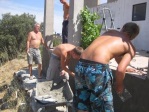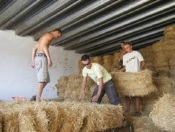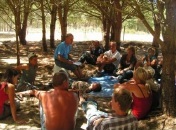Time-Out
Aim
Target group
Objectives
Support sequenceAdditional offer Trotzdem e. V.
Aim
This offer is aimed at young adults whose challenging behaviour prevents them from continuing to live in their current environment or situation and who therefore need a non-permanent residential care solution. A temporary stay at one of the project's homes in Portugal leads them to "calm down" due to an environment lacking in stimulants and the specific accompanying pedagogical programme. Beyond this, the reasons and triggers for the difficult behaviour, and also the resources and solution approaches, are analysed together with the young adults and, in parallel, with their family in their home country. Recommendations for subsequent support/future measures are developed with everyone involved and are co-designed and respectively implemented in coordination with the youth welfare office.
All in all, the offer provides time and space for thorough education planning, and for finding suitable forms of support.
The Time-Out project is intended for adolescents between about twelve and eighteen years old who are in a crisis situation, or in a situation that seems hopeless, and are affected by personal, family-related or social problems. These are usually children and young adults who no longer respect the boundaries set by adults, who are no longer able to comprehend the consequences of non-compliance with these boundaries and who can no longer be reached. For the most part, the behaviour of these children and young adults is characterised by the fact that they do as they please, spend time with dubious "friends" and/or act criminally, and potentially also consume drugs or alcohol. The preliminary stage in Portugal is also suitable for adolescents living in residential care facilities who do not respond to the support measures and intervention already instigated.
The aim of the Time-Out project is to remove young people from a tense social environment/an escalating crisis situation for a short term (maximum of three months) by placing them in an environment lacking in stimulants in order to address the crisis in an unbiased context. Two places are available for this. Placements in one of the three project locations managed by pedagogues or in a family-like 1:1 care and support situation are needs-oriented.
In more detail, the specific objectives of the work with the young people during their stay in Portugal are:
- to calm them down, to allow them to mentally distance themselves and to take away some of the mental strain
- to stop/interrupt inappropriate behaviour and interaction patterns
- to review the situation which led to their being placed in residential care (reflection about the reasons for stay at Time-Out, reflection on problematic relationships etc.)
- to develop approaches for alternative, socially acceptable action models
- to allow them to experience/witness themselves in a changed care environment
- adherence to a structured day and the taking on of responsibilities within a work related context
- accepting authority
- to develop resources, prospects, solutions
- socio-pedagogical diagnostics, if necessary performance diagnosis
- development of specific ideas/proposals regarding the future lifestyle (development of a proposal for the next support stage) under consideration of the results from the work with the family system in the home country
1. Preliminary / initial enquiry
- Placement availability ascertained in response to the initial enquiry
- Establishing contact with the young adult and with the system in their home country
- Preparation for Time-Out (1:1 or group setting)
- Clarification of the aim/issues to be resolved
- Collection of the young person by a member of the Progresso team
2. Work stage
 The work in Portugal is based on the establishment of a clear and straightforward everyday structure that enables the young adults to accept authority, rules and commitments.
The work in Portugal is based on the establishment of a clear and straightforward everyday structure that enables the young adults to accept authority, rules and commitments.
 Project depending, the day starts between 7.30am and 8am, always by breakfasting together. All meals are eaten together and at set times. During the day, clearly defined jobs, sports activities or household chores allow the young adults to gain practical life experiences; in the course of these, they might learn a craft or improve their stamina and physical condition. Within the limits allowed by the residential youth worker's pedagogical responsibility and supervision duties and a transparent set of the rules, the young people independently organise important areas of daily life for which they are then responsible. This includes, for example, cleaning their own rooms, the common rooms, the outside areas and doing their laundry, looking after animals, the garden or plants and also cooking.
Project depending, the day starts between 7.30am and 8am, always by breakfasting together. All meals are eaten together and at set times. During the day, clearly defined jobs, sports activities or household chores allow the young adults to gain practical life experiences; in the course of these, they might learn a craft or improve their stamina and physical condition. Within the limits allowed by the residential youth worker's pedagogical responsibility and supervision duties and a transparent set of the rules, the young people independently organise important areas of daily life for which they are then responsible. This includes, for example, cleaning their own rooms, the common rooms, the outside areas and doing their laundry, looking after animals, the garden or plants and also cooking.
 At the beginning of their stay in Portugal, individual and realistic goals for the time-out as such and also for the subsequent aims and the steps required to reach these are developed together with the young person and agreed in writing. The goals and the daily behaviour are reflected on in weekly group meetings. Everyone is asked to write down their personal biography from day one; the individual parts of this written biography are then discussed one by one with a pedagogue in one-to-one meetings.
At the beginning of their stay in Portugal, individual and realistic goals for the time-out as such and also for the subsequent aims and the steps required to reach these are developed together with the young person and agreed in writing. The goals and the daily behaviour are reflected on in weekly group meetings. Everyone is asked to write down their personal biography from day one; the individual parts of this written biography are then discussed one by one with a pedagogue in one-to-one meetings.
 As required and always individually tailored to each young person, various individual projects ("EZP") are offered, such as accompanied hikes lasting several days, in order to increase or strengthen self-awareness, the experiencing of limits, determination and the ability to overcome difficult situations, self-assuredness and much more.
As required and always individually tailored to each young person, various individual projects ("EZP") are offered, such as accompanied hikes lasting several days, in order to increase or strengthen self-awareness, the experiencing of limits, determination and the ability to overcome difficult situations, self-assuredness and much more.
Progresso also offers educational assessments to evaluate the educational level of a young person after frequently prolonged periods of absence from school.
They can use their spare time as they like, for instance for activities such as reading, listening to music, team games, arts and crafts, hiking, sports, shopping, homework, taking care of animals etc. Joint group activities on offer include sports and a wide range of leisure time offers such as exploring the surrounding area and nature through excursions, cycling tours, canoe tours, hikes and games afternoons.
Regular daily routines, regular group meetings or reviewing the day together during the joint mealtimes are all fundamental rituals that add structure to their everyday lives, which is something we particularly value. They provide security, inspire a community feeling and communicate the positive social consequences of gradual development to the group.
Another important element of the work at the project locations is animal-related work (horses, dogs, cats, chickens). This teaches the young people to take on the responsibility for another living being. If they find it difficult to trust other people, animals can be key to unlocking their emotional world. Especially the work with horses allows emotionally and socially challenged young adults to experience relationships at a completely new level, as the animals always respond immediately to the respective situation, which allows the young adults to experience cause and effect always in direct relation to their own behaviour. Riding and working with horses also teaches them to think of others, increases their self-awareness and also their body awareness.
During the entire time-out, the PROGRESSO team members responsible for the case exchange information with the funding welfare organisation on a regular basis; the respective results are communicated promptly and integrated into the ongoing process both in Portugal and also in the home country.
3. Evaluation and recommendations
After a working period of approx. 10 weeks, a social pedagogical evaluation is carried out in Portugal.
4. Return home
Depending on the results developed in coordination with the youth welfare office and the system in their home country/their legal guardian, the young adult is accompanied back to their home country. If necessary, a subsequent measure within the scope of the long-term support and intensive pedagogical care programme in Portugal is also an option, depending on the circumstances and the situation.
Additional offer Trotzdem e. V.
In parallel to the time out spent by the young adult in Portugal, Trotzdem e.V. examines the reasons and triggers for the difficult behaviour, the resources and solution approaches with the young adult's family or reference system in Germany.
The systemic work with the family or reference system is jointly carried out by a team of two family therapists. In eight meetings, the crisis triggers, resources, integration and development options within the scope of the family system are identified and developed during home visits using systemic family counselling/therapy methods (case-related genogram work, resource analysis, family sculpting, network card, family chronology, turning point analysis, solution options etc.). The results are one element of the assessment or recommendations for subsequent support, or the young adult's extended stay.
The aims of the systemic work with the family system in Germany carried out by Trotzdem e.V. are:
- the identification of the fundamental structures, patterns and dynamics that are the reason for the behaviour and the current and specific situation of the young adult (family rules, conscious/unconscious tasks, important biographical events, allocated roles etc.) that are significant in terms of the behaviour from a diagnostic perspective and the emergence of the crisis-like events, and play a role in the development of suitable future prospects
- network analysis, identification of people, contexts, factors that are useful and could play a positive role in the course of the establishment of a good solution for supporting the further development of the young adult
- development of an assessment of the attachment and stabilisation capabilities in the given context
- development of an assessment of the attachment figures (parents, care workers, others) in terms of willingness to change, willingness to accept help and willingness to cooperate with stabilising, solution relevant support offers
- feedback of the results of the work with the young adult in Portugal and subsequent work with these
Progresso and Trotzdem e. V. cooperate closely to ensure the following objectives are met:
- ongoing exchange between the coordinating professional at Progresso and the Progresso und Trotzdem e. V. professional responsible for coordinating the family therapy work with the family system in Germany; mutual input of the respective results of the work in both places.
- development of a comprehensive joint report which contains both the results of the work with the young adult in Portugal and also the results of the work with the family system in Germany
- development of a proposal regarding the future shape of the young adult's life after the time-out in collaboration with the young adult, the youth welfare office and the parents/reference system
- preparing the young adult for their return
- initiation of the implementation of the proposal developed.
Follow-up support recommendations are developed in the course of the consolidation of the results of the diagnostics carried out within the family system in Germany. The client receives a comprehensive diagnostics report which summarises the written results from the work with the young adult in Portugal and the work with the family system in Germany.
Trotzdem e. V. also offers additional support during the return to the family system, transfer to other facilities or independent living.
[ up ]